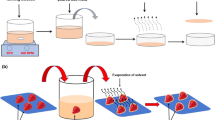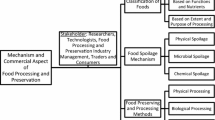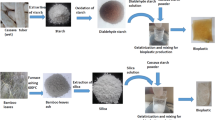Abstract
Food spoilage is associated with pH change. Thus, the aim of this study was to develop a pH-sensing film based on the addition of anthocyanin extracted from jaboticaba peel to a biopolymeric matrix. UV–Vis spectroscopy analysis of the anthocyanin extract was performed to detect the color change in a broad pH range (1–11). Also, the thermal properties, morphology, moisture content (MC), water solubility (WS), water vapor permeability (WVP) and release test results were examined. The applicability of the pH-sensing film as intelligent packaging was tested by monitoring milk spoilage. Results showed that the film developed has satisfactory thermal stability up to 200 °C. Also, the MC and WVP properties of the film were reduced when the anthocyanin extract was present, 11.5% and 6.5 × 10–10 g H2O Pa− 1 s−1 m−1, respectively, while the WS showed an increase (54.33%). Release tests showed remarkable performance in simulated alcoholic and fatty aqueous foods. The food application test demonstrated the potential use of the anthocyanin-based film as a food quality indicator due to film visual color change (\(\Delta E\)>10, after 8 days of milk spoilage monitoring).




Similar content being viewed by others
References
ANVISA. Agência Nacional de Vigilância Sanitária. Resolução da Diretoria Colegiada – RDC nº 51, de 26 de novembro de 2010. Migração em materiais, embalagens e equipamentos plásticos destinados a entrar em contato com alimentos. http://portal.anvisa.gov.br/documents/10181/2718376/RDC_51_2010_COMP.pdf/
Carlos-Salazar V-N (2017) Release of anthocyanins from chitosan films cross-linked with sodium tripolyphosphate. Revista de la Sociedad Química del Perú 83:115–125
Chen H-Z, Zhang M, Bhandari B, Yang C-H (2020) Novel pH-sensitive films containing curcumin and anthocyanins to monitor fish freshness. Food Hydrocolloids 100:1–11. https://doi.org/10.1016/j.foodhyd.2019.105438
Chi W, Cao L, Sun G, Meng F, Zhang C, Li J, Wang L (2020) Developing a highly pH-sensitive κ-carrageenan-based intelligent film incorporating grape skin powder via a cleaner process. J Clean Prod 244:118862. https://doi.org/10.1016/j.jclepro.2019.118862
Choi I, Lee JY, Lacroix M, Han J (2017) Intelligent pH indicator film composed of agar/potato starch and anthocyanin extracts from purple sweet potato. Food Chem 218:122–128. https://doi.org/10.1016/j.foodchem.2016.09.050
EUROPEAN COMMISSION. DIRECTIVE 97/48/EC of 29 July 1997 amending for the second time Council Directive 82/711/EEC laying down the basic rules necessary for testing migration of the constituents of plastic materials and articles intended to come into contact with foodstuffs (text with EEA relevance). https://op.europa.eu/en/publication-detail/-/publication/daa3c654-7a50-4438-b6d9-cd93b86b2b1b.
Ezati P, Rhim J-W (2020) pH-responsive chitosan-based film incorporated with alizarin for intelligent packaging applications. Food Hydrocolloids 102:1–10. https://doi.org/10.1016/j.foodhyd.2019.105629
Garcia PS, Turbiani FRB, Baron AM, Brizola GL, Tavares MA, Yamashita F, Eiras D, Grossmann MVE (2018) Sericin as compatibilizer in starch/polyester blown films. Polímeros 28:389–394. https://doi.org/10.1590/0104-1428.05117
Hazrol MD, Sapuan SM, Zainudin ES, Zuhri MYM, Abdul Wahab NI (2021) Corn starch (Zea mays) biopolymer plastic reaction in combination with sorbitol and glycerol. Polymers 13:242. https://doi.org/10.3390/polym13020242
Heredia FJ, Francia-Aricha EM, Rivas-Gonzalo JC, Vicario IM, Santos-Buelga C (1998) Chromatic chaterization of anthocyanins from red grapes-I. pH effect. Food Chem 63:491–498. https://doi.org/10.1016/S0308-8146(98)00051-X
Hoffmann TG, Peters DA, Angioletti BL, Bertoli SL, Péres LV, Reiter MGR, Souza CK (2019) Potentials nanocomposites in food packaging. Chem Eng Trans 79:253–258. https://doi.org/10.3303/CET1975043
Kannat SR (2020) Development of active/intelligent food packaging film containing Amaranthus leaf extract for shelf life extension of chicken/fish during chilled storage. Food Packag Shelf Life 24:100506. https://doi.org/10.1016/j.fpsl.2020.100506
Liu J, Wang H, Wang P, Guo M, Jiang S, Li X, Jiang S (2018) Films based on κ-carrageenan incorporated with curcumin for freshness monitoring. Food Hydrocolloids 83:134–142. https://doi.org/10.1016/j.foodhyd.2018.05.012
Luchese CL, Sperotto N, Spada JC, Tessaro IC (2017) Effect of blueberry agro-industrial waste addition to corn starch-based films for the production of a pH-indicator film. Int J Biol Macromol 104:11–18. https://doi.org/10.1016/j.ijbiomac.2017.05.149
Ma Q, Wang L (2016) Preparation of visual pH-sensing film based on tara gum incorporating cellulose and extracts from grape skins. Sens Actuators, B Chem 235:401–407. https://doi.org/10.1016/j.snb.2016.05.107
McCort-Tipton M, Pesselman RL (2000) What simulant is right for my intended end use? ACS symposium series. Food Pack Test Methods Appl 753:83–90
Musso YS, Salgado PR, Mauri AN (2016) Gelatin based films capable of modifying its color against environmental pH changes. Food Hydrocolloids 61:523–530. https://doi.org/10.1016/j.foodhyd.2016.06.013
Musso YS, Salgado PR, Mauri AN (2019) Smart gelatin films prepared using red cabbage (Brassica oleracea L.) extracts as solvent. Food Hydrocolloids 89:674–681. https://doi.org/10.1016/j.foodhyd.2018.11.036
Pelissari FM, Andrade-Mahecha MM, Menegalli FC (2013) Comparative study on the properties of flour and starch films of plantain bananas (Musa paradisiaca). Food Hydrocolloids 30:681–690. https://doi.org/10.1016/j.foodhyd.2012.08.007
Pourjavaher S, Almasi H, Meshkini S, Pirsa S, Parandi E (2017) Development of a colorimetric pH indicator based on bacterial cellulose nanofibers and red cabbage (Brassica oleraceae) extract. Carbohyd Polym 156:193–201. https://doi.org/10.1016/j.carbpol.2016.09.027
Poyatos-Racionero E, Ros-Lis JV, Vivancos J-L, Martínez-Máñez R (2018) Recent advances on intelligent packaging as tools to reduce food waste. J Clean Prod 172:3398–3409. https://doi.org/10.1016/j.jclepro.2017.11.075
Prietto L, Mirapalhete TC, Pinto VZ, Hoffmann JF, Vanier NL, Lim LT, Dias ARG, Zavareze EDR (2017) pH-sensing films containing anthocyanins extracted from black bean seed coat and red cabbage. LWT Food Sci Technol 80:492–500. https://doi.org/10.1016/j.lwt.2017.03.006
Roy S, Rhim J-W (2021) Preparation of gelatin/carrageenan-based color-indicator film integrated with shikonin and propolis for smart food packaging applications. ACS Appl Bio Mater 4:770–779. https://doi.org/10.1021/acsabm.0c01353
Sánchez-González L, Cháfer M, González-Martínez C, Chiralt A, Desobry S (2011) Study of the release of limonene present in chitosan films enriched with bergamot oil in food simulants. J Food Eng 105:138–143. https://doi.org/10.1016/j.jfoodeng.2011.02.016
Sun G, Chi W, Xu S, Wang L (2018) Developing a simultaneously antioxidant and pH-responsive κ-carrageenan/hydroxypropyl methylcellulose film blended with Prunus maackii extract. Int J Biol Macromol 155:1393–1400. https://doi.org/10.1016/j.ijbiomac.2019.11.114
Wang X, Yong H, Gao L, Li L, Jin M, Liu J (2019) Preparation and characterization of antioxidant and pH-sensitive films based on chitosan and black soybean seed coat extract. Food Hydrocolloids 89:56–66. https://doi.org/10.1016/j.foodhyd.2018.10.019
Xu J, Andrews TD, Shi Y (2020) Recent Advances in the Preparation and Characterization of Intermediately to Highly Esterified and Etherified Starches: A Review. Starch 72:1900238. https://doi.org/10.1002/star.201900238
Yong H, Wang X, Bai R, Miao Z, Zhang X, Liu J (2019) Development of antioxidant and intelligent pH-sensing packaging films by incorporating purple-fleshed sweet potato extract into chitosan matrix. Food Hydrocolloids 90:216–224. https://doi.org/10.1016/j.foodhyd.2018.12.015
Yun D, Cai H, Liu Y, Xiao L, Song J, Liu J (2019) Development of active and intelligent films based on cassava starch and Chinese bayberry (Myrica rubra Sieb. et Zucc.) anthocyanins. RSC Adv 9:30905–30916. https://doi.org/10.1039/c9ra06628d
Zhang K, Huang T-S, Yan H, Hu X, Ren T (2020) Novel pH-sensitive films based on starch/polyvinyl alcohol and food anthocyanins as a visual indicator of shrimp deterioration. Int J Biol Macromol 145:768–776. https://doi.org/10.1016/j.ijbiomac.2019.12.159
Acknowledgments
The authors gratefully acknowledge financial support from Coordenação de Aperfeiçoamento de Pessoal de Nível Superior—CAPES [finance code 001] and Fundação de Amparo à Pesquisa do Estado de Santa Catarina – FAPESC [grant number TO 2018TR342].
Funding
Coordenação de Aperfeiçoamento de Pessoal de Nível Superior—CAPES [finance code 001] and Fundação de Amparo à Pesquisa do Estado de Santa Catarina – FAPESC [grant number TO 2018TR342].
Availability of data and materials
The datasets used and/or analysed during the current study are available from the corresponding author on reasonable request.
Author information
Authors and Affiliations
Contributions
TGH conceived, carried out the experiments and wrote and edited the manuscript; BLA edited the manuscript; SLB and CKS supervised the work and edited the manuscript.
Corresponding author
Ethics declarations
Conflict of interest
The authors declare that they have no competing interests.
Ethics approval
Not applicable.
Consent to participate
Not applicable.
Consent for publication
Not applicable.
Additional information
Publisher's Note
Springer Nature remains neutral with regard to jurisdictional claims in published maps and institutional affiliations.
Rights and permissions
About this article
Cite this article
Hoffmann, T.G., Angioletti, B.L., Bertoli, S.L. et al. Intelligent pH-sensing film based on jaboticaba peels extract incorporated on a biopolymeric matrix. J Food Sci Technol 59, 1001–1010 (2022). https://doi.org/10.1007/s13197-021-05104-6
Revised:
Accepted:
Published:
Issue Date:
DOI: https://doi.org/10.1007/s13197-021-05104-6




